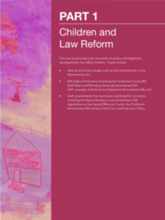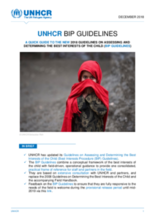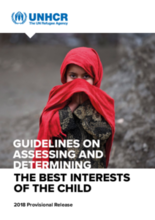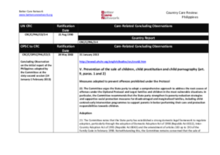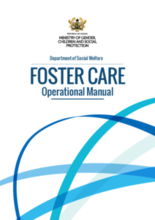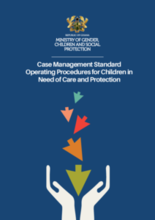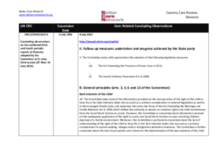Displaying 41 - 50 of 365
This chapter from the South African Child Gauge 2018 reviews the latest developments in law and policy affecting children in South Africa.
The BIP Guidelines combine a conceptual framework of the best interests of the child with field-driven, operational guidance to provide one consolidated, practical frame of reference for staff and partners in the field. This document provides a guide to the 2018 updated Guidelines, including what's new, why they were revised, and what's next.
These updated UN High Commissioner for Refugees (UNHCR) Guidelines provide guidance on determining the best interests of the child in decisions affecting children at risk, in particular children who are separated from their parents and families.
This country care review includes the care related Concluding Observations adopted by the Committee on the Rights of the Child and the Committee on the Rights of Persons with Disabilities.
The purpose of this Foster Care Operational Manual is to provide guidance to Department of Social Welfare (DSW) officers and Foster Care Agencies on the delivery of foster care services in line with the Children’s Amendment Act, 2016 and Foster Care Regulations 2018.
This study from the Institutionalised Children: Explorations and Beyond Special Issue on Aftercare is aimed at studying the concept of aftercare from the prism of human rights and the international framework in context of the Convention on the Rights of the Child and the UN resolution, Guidelines for the Alternative Care of Children. Furthermore, the research is aimed at analysing the legal provisions and standards provided within the Indian legal system and how far it is attuned to the international standards.
In this chapter children’s rights and state obligations in relation to alternative care are presented, with reference to the UN Alternative Care Guidelines and the general comments and concluding observations of the UN Committee on the Rights of the Child.
These Standard Operating Procedures (SOPs) describe guiding principles, procedures, roles and responsibilities in the prevention of and response to child protection for children residing within Ghana.
This Country Care Review includes the care-related concluding observations adopted by the Committee on the Rights of the Child and the Committee on the Rights of Persons with Disabilities, as well as other care-related concluding observations, ratification dates, and links to the Universal Periodic Review and Hague Intercountry Adoption Country Profile.
This is the report of the 3rd Biennial International Conference (3rd BICON) on “Evolving Trends in Alternative Care for Children in South Asia” that was convened by Udayan Care on March 16 & 17, 2018 at Amity University, Noida NCR (India).

